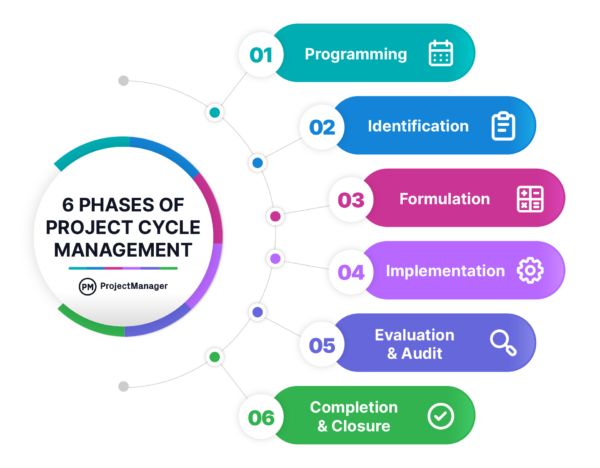Project cycle management (PCM)
The different phases of the Project Cycle Management are
- Programming
- Identification
- Formulation
- Implementation
- Evaluation and Audit

I) Programming :
– The purpose of Programming is to assess the main objectives and priorities of the sector, and thus to provide a relevant and feasible programming framework within which programs and projects can be identified and prepared.
II) Identification :
– The purpose of the identification phase is to:
a) identify project ideas that are consistent with the sector national framework, the sector strategy, the sector programme (if existing) and partner development priorities;
b) assess the relevance and likely feasibility of these project ideas consulting stakeholders (beneficiaries in particular) and other sector partners;
c) assess the possibility of overlapping and other criticalities with other projects or programmes in the sector
d) prepare a project identification document summarizing the results of the ideas and the financial aspects; and
e) determine the scope of the further work required for individual projects during the formulation stage.
III) Formulation :
-The purpose of the formulation phase is to
a) Confirm the relevance and feasibility of the project ideas as proposed in the identification phase;
b) Prepare a detailed project design, including the management and coordination arrangements, financing plan, cost-benefit analysis, risk management, monitoring, evaluation and audit arrangements;
c) Prepare a proposal including all the documents above mentioned to be submitted to the funding organization or to the government.
IV) Implementation including monitoring and reporting :
– The purpose of the implementation stage is to:
a) Deliver the results and contribute effectively to the overall objective of the project;
b) Manage the available resources efficiently; and
c) Monitor and report on progress of activities.
V) Evaluation :
-The purpose of evaluation is to :
a) Contribute to improving sector policies, strategies, procedures or techniques;
b) consider a continuation or discontinuation of a project/programme;
c) accountability for expenditures to stakeholders and tax payers;
VI) Audit :
– The purpose of an audit is to:
a) Assess an activity/subject that is the responsibility of another party against identified suitable criteria, and
b) Express a conclusion (i.e. qualified opinion) that provides the intended user with a level of assurance about the activity/subject being audited.